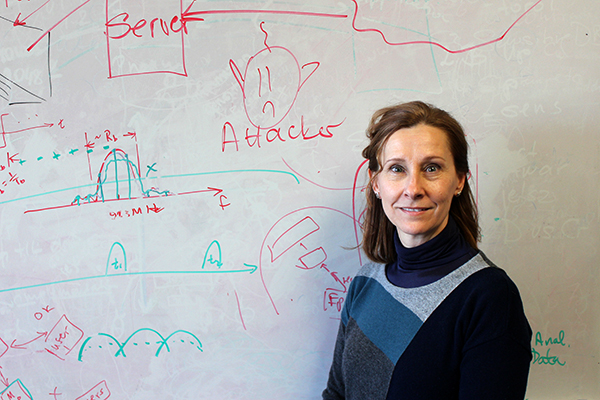 Dr. Farkas
Dr. Farkas talks about cyber security
to USC News:
"There is a demand to explain cyber security concepts in a way that is understandable to the general public," says Csilla Farkas, a computer science professor in the College of Engineering and Computing. "We can’t expect business leaders to become cyber security experts, but the experts can learn to express cyber security threats in such a way that business executives can make informed decisions."
If you are interested in cybersecurity, apply for our
cybersecurity specialization or
certificate and drop by the
Cybersecurity club.
The full article:
Imagine you’re a CEO trying to decide how much budget to devote to cyber security for your company. News headlines about disruptive hacks and cyber attacks have you worried, and the detailed technical explanations from the IT staff aren’t helping.
"There is a demand to explain cyber security concepts in a way that is understandable to the general public," says Csilla Farkas, a computer science professor in the College of Engineering and Computing. "We can’t expect business leaders to become cyber security experts, but the experts can learn to express cyber security threats in such a way that business executives can make informed decisions."
To that end, Farkas is using a grant awarded jointly from the Center for Teaching Excellence/Carolina Leadership Initiative to introduce a stronger communications component to a cyber security course. The idea was to introduce the students to leadership characteristics and public speaking attributes --- then have the students demonstrate those skills in a "shark tank" competition.
"Students worked in small groups developing novel security technologies. In addition to detailed project reports, each group presented its proposed technology before a panel of external judges to obtain funding," Farkas said. "The catch was that some of the panel members were not computing professionals and the students couldn’t use any technical jargon to convince them about the significance of their research. I think the students improved a lot in communication skills."
Computer information systems major David Brookins came into the course with a rudimentary understanding of cyber security issues and personal experience with attempting to explain the importance of safe browsing habits to his mom.
"The course was structured in a way that explained the core concepts to us early on," he said "Once you have a thorough understanding of something, breaking it down to its core concepts and explaining those in a way a lay person would understand becomes much easier."
"Over the break, for example, I was able to break down the idea behind a Distributed Denial of Service Attack to my mom to explain why I couldn't log into my Playstation."
Student Aaron Hein liked the challenge of the course, especially the presentation to the judges. That exercise will probably become a routine reality when he joins the work force, he said.
"The reality today is that business people hold the purse strings, and even in taking a corporate job one must often sell ideas, designs or the need for security to the people who have to pay for it," Hein said. "It's often not an easy sell. Dr. Farkas included that problem in with her security class in a meaningful way and gave us some insight into how to prepare for that type of presentation."
 Dr. Farkas talks about cyber security to USC News:
Dr. Farkas talks about cyber security to USC News: